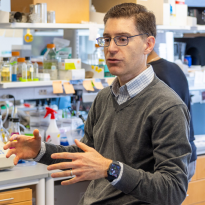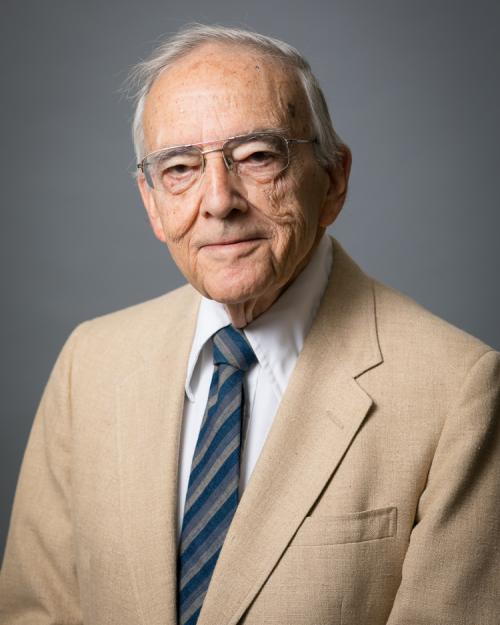Benjamin Widom, Ph.D. ’53, Goldwin Smith Professor Emeritus in the Department of Chemistry and Chemical Biology in the College of Arts and Sciences (A&S), died Jan. 23 in Ithaca. He was 97.
An influential scientist in the field of physical chemistry, Widom was awarded the Boltzmann medal, one of the highest honors in the field, in 1998 for his work in statistical mechanics. He joined the Cornell faculty in 1954 and became emeritus in 2007, remaining active in the field after retirement.
“Ben Widom was widely admired as a pathbreaking researcher, as a lucid communicator of the most complex scientific ideas and findings, and as a wonderful person,” said Roger Loring, professor of chemistry and chemical biology (A&S).
Widom’s pioneering insights and research accomplishments played a foundational role in the development of the present understanding of the thermodynamics of liquids. He is particularly associated with advances in the computation of the “critical phenomena” connected to changes in the states of matter.
Widom initially applied fundamental theories that now bear his name – “Widom scaling ansatz,” “Widom exponent relation,” and “Widom particle insertion method” – to the behavior of fluids and fluid mixtures. But these theories would turn out to be universal in character and apply equally to diverse topics, including magnetism and superconductivity.
Colleagues and students recognized Widom for his excellence as a teacher, both at the introductory undergraduate level and in the most advanced courses in thermodynamics, kinetics and statistical mechanics, said Bruce Ganem, the Franz and Elisabeth Roessler Professor in the Department of Chemistry and Chemical Biology (A&S).
“The clarity of his presentations always reflected a precision of thought and depth of understanding that few teachers possess,” Ganem said. “Ben could communicate even the most complex theories in a simple and positive manner, and he enlightened and inspired several generations of young chemists who took his courses.”
“The legendary clarity and lucidity of his lectures made an immediate and extraordinary impact on me,” said Gregory Ezra, professor of chemistry and chemical biology (A&S), who first encountered Widom when he was a graduate student at Oxford University and Widom gave a series of lectures there on critical phenomena.
“I subsequently had the great good fortune to have Ben as a Cornell colleague for many years,” Ezra said. “During that time, he was a constant source of inspiration as scientific researcher, teacher and human being.”
“Ben was one of the true giants in his area of science, but one would be hard-pressed to guess this from the way he carried himself. Always thoughtful and gentle, always approachable and affable, one could go to him with whatever questions one had,” said Avik Chatterjee, Ph.D. ’96, a faculty member at the State University of New York College of Environmental Science and Forestry. “Always kind, he would explain patiently, chalk in hand meticulously covering blackboards with a writing so elegant it was something to admire in itself.”
“For me, he was an example of not only one of the greatest scientists but also one of the nicest people who taught me how to be a good researcher and a decent man,” said Anatoly B. Kolomeisky, Ph.D. ’98, a faculty member at Rice University, for whom Widom served as doctoral advisor. “I have been following his advice all my life.”
Widom frequently treated graduate students, postdoctoral researchers, department colleagues and visiting researchers to Saturday pizza lunches at Ithaca’s Souvlaki House. Over the years, Widom worked out a formula to compute the perfect assortment of pizza sizes and quantities based on the ages and career stages of his fellow diners, and there was rarely any left over.
“The warmth and generosity that Ben showed on those occasions typified his professional life, and were revered by scientists all over the world, even those who had not enjoyed a feta and garlic pizza in his company,” Loring said.
Benjamin Widom was born Oct. 13, 1927, in Newark, New Jersey. The family moved to Brooklyn, New York, and he graduated from Stuyvesant High School in Manhattan. He enrolled at Brooklyn College but transferred to Columbia University upon receiving a Pulitzer Scholarship to finish his undergraduate studies, which were interrupted due to one year of service in the U.S. Army.
For his doctoral studies, Widom took, among other courses, introductory quantum mechanics and then statistical mechanics from Hans Bethe, who received the Nobel Prize in physics in 1967, and differential equations from renowned mathematician Mark Kac. Widom’s doctoral research focused on the quantum mechanical theory of molecular collisions.
During postdoctoral research at the University of North Carolina, he began his longtime study of critical phenomena.
Widom joined the Cornell chemistry faculty in 1954. He came to lead a robust community of critical phenomena scholarship and developed his reputation for excellence in teaching at all levels.
In addition to his many influential articles, Widom published two books: “Molecular Theory of Capillarity,” co-authored with John Rowlinson (1982); and “Statistical Mechanics: A Concise Introduction for Chemists” (2002).
He served as chair of the Department of Chemistry from 1978-1981, and received several major awards in addition to the Boltzman Medal, including the American Chemical Society (ACS) Langmuir Medal in Chemical Physics in 1982; and the ACS Award in Theoretical Chemistry in 1999. He was elected a member of the National Academy of Sciences in 1974 and a fellow of the American Academy of Arts and Sciences in 1979.
Widom was predeceased by his son, Jonathan Widom ’77. He is survived by his wife of more than 73 years, Joanne (McCurdy) Widom ’53; children Michael Widom ’80 and Elisabeth Widom ’84; three grandchildren; and many other family members.





